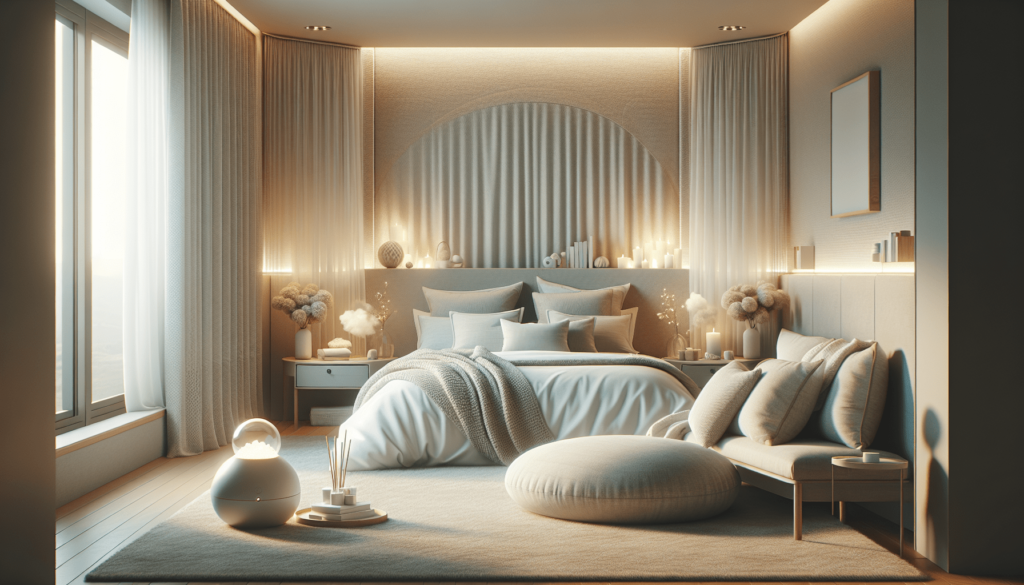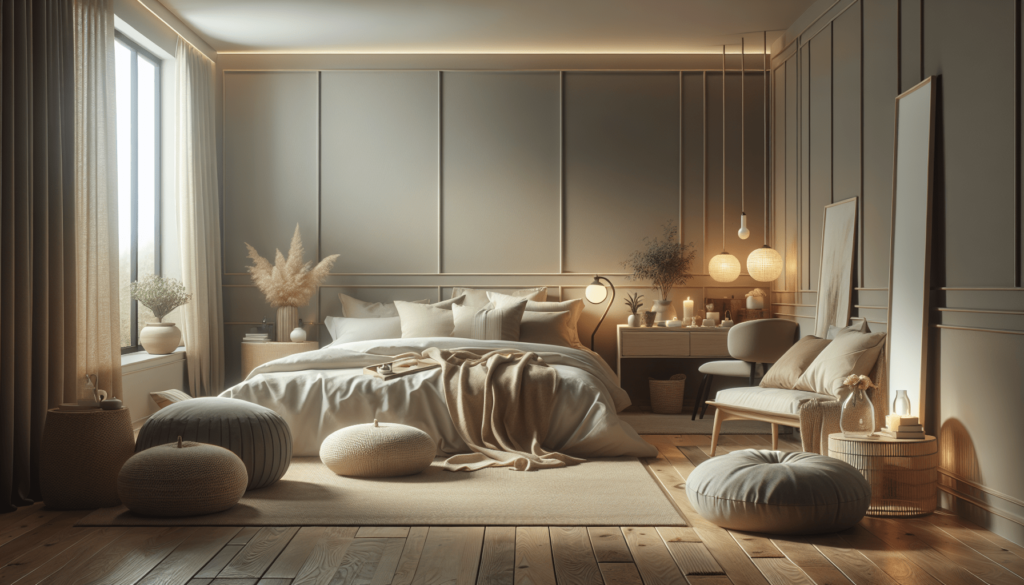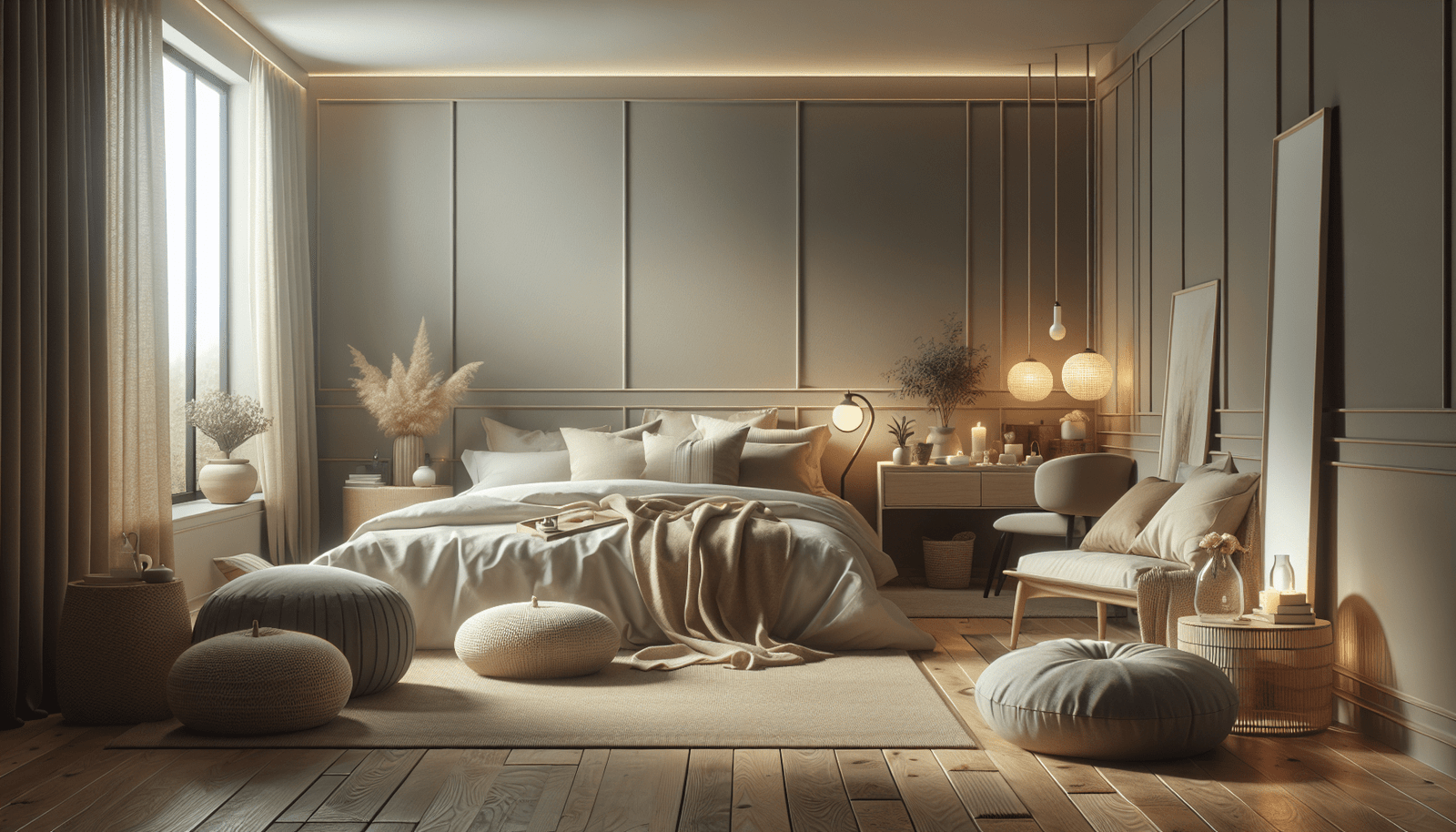Creating a sleep-friendly bedroom environment is essential for achieving a restful and rejuvenating night’s sleep. From controlling the lighting to selecting the right bedding, there are several key factors that can greatly impact your sleep quality. Whether you struggle with falling asleep or staying asleep, small changes to your bedroom setup can make a big difference in promoting a conducive atmosphere for sleep. In this article, we will explore some practical tips and strategies to help you transform your bedroom into the ultimate sleep sanctuary. Creating a sleep-friendly bedroom environment is essential for ensuring a good night’s rest. The right lighting, temperature, sound, bedding, and organization can greatly impact the quality of your sleep. In this article, we will explore various tips and techniques to help you optimize your bedroom for better sleep.

Lighting
Lighting plays a crucial role in setting the mood and promoting relaxation in your bedroom. To block out external light, consider using blackout curtains or blinds. These will help create a dark and peaceful ambiance, especially if you live in a well-lit area or have street lights outside your window.
Installing dimmer switches is another great option to adjust the lighting intensity according to your needs. This allows you to create a cozy and calming atmosphere, especially in the evenings when you’re winding down for sleep. By dimming the lights, you signal to your brain that it’s time to relax and prepare for rest.
In addition, it’s important to avoid using bright overhead lights in the bedroom. Bright lights can be stimulating and interfere with the body’s natural sleep-wake cycle. Instead, opt for warm, soothing colors for your bedroom walls and decor. These colors, such as soft blues, greens, or neutrals, can create a serene and tranquil environment that promotes relaxation.
Lastly, incorporating soft, ambient lighting sources like bedside lamps or salt lamps can enhance the overall coziness of your bedroom. These softer lights are not only visually appealing but also help create a relaxing environment for better sleep.
Temperature
Maintaining an optimal room temperature is crucial for a good night’s sleep. The ideal temperature for most people is between 60-67 degrees Fahrenheit. Sleeping in a cool room can prevent overheating and sweating, which can disrupt sleep and lead to discomfort.
To regulate the temperature, consider using a fan or air conditioner during warmer months. These devices can help circulate the air and create a cooler environment. It’s also important to invest in a good quality mattress and bedding appropriate for different seasons. Look for materials that are breathable and can wick away moisture, such as cotton or bamboo-based fabrics.
Sound
External noise can be a major disturbance when trying to fall asleep. To reduce noise, you can employ soundproofing techniques like double-glazed windows or using earplugs. These methods can greatly minimize the impact of outside noise and create a quieter and more peaceful sleep environment.
Another effective way to counter external noise is by using white noise machines or apps. White noise can help drown out disruptive sounds and create a soothing background sound that lulls you to sleep. Alternatively, you can opt for playing soft and calming music or sounds like nature sounds to create a peaceful atmosphere in your bedroom.
It’s important to note that electronic devices with loud notifications should be kept out of the bedroom to avoid any disruptive sounds or disturbances. The focus should be on creating a quiet and tranquil space that promotes relaxation and sleep.

Bedding and Mattress
Investing in a comfortable and supportive mattress is essential for a good night’s sleep. The right mattress should cater to your personal preferences, whether you prefer a firm or soft surface. It’s important to try out different options and find the one that suits you best. A mattress that properly supports your body can alleviate pressure points and ensure proper spinal alignment, preventing any discomfort or pain.
Equally important is choosing the right pillows that provide adequate neck and head support. Again, personal preference plays a role here. Some people may prefer a higher loft pillow, while others may prefer a flatter one. Experimenting with different options can help you find the pillow that perfectly cradles your head and neck, allowing for a comfortable and restful sleep.
When it comes to bedding, opting for breathable and hypoallergenic materials is key. Natural fabrics like cotton or bamboo are excellent choices as they allow for better airflow, preventing overheating during the night. Regularly cleaning and replacing bedding is also important to ensure cleanliness and maintain a fresh sleep environment. Additionally, considering the use of weighted blankets for relaxation and anxiety reduction can be beneficial for some individuals.
Organization and Clutter
A clutter-free and well-organized bedroom can have a significant impact on your sleep quality. Clutter and disorganization can create a sense of chaos and make it difficult to relax. Utilizing storage solutions like bins, shelves, or under-bed storage can help keep your belongings in order and create a visually appealing space.
Creating designated spaces for different activities can also enhance the functionality of your bedroom. For example, having a reading nook with a cozy chair or a small desk for journaling or working can help separate different dimensions of your life and create a sense of tranquility.
Moreover, it’s important to remove distractions and unrelated items from the bedroom. Your bedroom should primarily be a space for sleep, intimacy, and relaxation. By keeping it free of distractions like work-related materials or electronic devices, you can signal to your brain that it’s time to unwind and prepare for rest.
Aromatherapy
Soothing scents can have a profound impact on relaxation and sleep. Aromatherapy, the practice of using essential oils for therapeutic purposes, can help create a tranquil sleep environment. Scents like lavender, chamomile, or vanilla are known to promote relaxation and sleep.
Use essential oil diffusers or linen sprays to add fragrance to your bedroom. These can create a calming ambiance and fill the air with soothing scents. However, be mindful not to use overpowering or stimulating fragrances that may disrupt sleep. It’s important to find a balance and use scents that promote relaxation without overwhelming the senses.
Technology
In today’s digital age, it’s crucial to create boundaries between technology and sleep. Eliminating electronics from the bedroom entirely or keeping them out of reach is highly recommended. The blue light emitted by screens can suppress the production of melatonin, a hormone that regulates sleep.
Setting a bedtime routine that includes turning off electronic devices at least an hour before sleep can help signal to the body that it’s time to wind down. Using blue light filters or night mode on electronic screens can also minimize the impact of blue light on sleep quality.
For those interested in monitoring their sleep quality, sleep tracking devices can be helpful. These devices can provide insights into your sleep habits, helping you identify patterns and make adjustments accordingly. However, it’s important not to become overly reliant on technology and to prioritize implementing other sleep-friendly strategies for optimal rest.
Comfort and Personalization
Making your bedroom a comfortable and inviting space is essential for promoting relaxation and sleep. Choosing comfortable and supportive furniture, such as a cozy chair or reading nook, can enhance the overall comfort of your bedroom. These spaces can become sanctuaries for relaxation and provide a separate area for activities like reading or enjoying a cup of tea before bed.
Personal touches in the form of artwork, photos, or decor that bring joy can also contribute to a sleep-friendly environment. These items can create a sense of warmth and familiarity, making your bedroom a place you look forward to visiting at the end of the day.
Additionally, ensuring that your mattress, pillows, and bedding cater to your personal preferences is crucial. Experimenting with different options and finding what works best for you can significantly improve your sleep quality. Taking the time to invest in items that enhance relaxation, such as a cozy robe or slippers, can also contribute to the overall comfort of your sleep environment.
Air Quality
The quality of air in your bedroom can have a direct impact on sleep. Keeping the bedroom well-ventilated by opening windows or using air purifiers can improve air circulation and ensure a fresh sleep environment. Good ventilation helps remove any stale air and can prevent stuffiness that may be detrimental to sleep.
Avoid smoking or allowing smoking in the bedroom, as the smell and toxins from cigarettes can severely impact air quality. Regularly cleaning and vacuuming the bedroom can also help prevent the accumulation of dust and allergens, creating a cleaner and healthier sleep space. Using hypoallergenic bedding materials can further reduce allergic reactions and ensure a more comfortable sleep environment for those with allergies or sensitivities.
Daily Habits and Routine
Establishing a consistent sleep schedule is essential for maintaining healthy sleep habits. Going to bed and waking up at the same time each day can help regulate your internal body clock and promote better sleep. Consistency is key when it comes to sleep, and having a routine can help signal to your body that it’s time to wind down and prepare for rest.
Creating a relaxing bedtime routine can greatly improve your sleep quality. Engaging in activities that promote relaxation, such as reading a book, taking a warm bath, or practicing mindfulness, can help prepare your mind and body for sleep. Avoid consuming caffeine or stimulating substances close to bedtime, as these can interfere with the ability to fall asleep and stay asleep.
In conclusion, creating a sleep-friendly bedroom environment requires attention to various factors, including lighting, temperature, sound, bedding, organization, aromatherapy, technology, comfort, air quality, and personal habits. By making intentional adjustments to these aspects, you can transform your bedroom into a sanctuary of rest and relaxation. Experiment with the suggestions provided in this article and tailor them to your individual needs and preferences, and soon you’ll be enjoying a peaceful and rejuvenating sleep every night.
